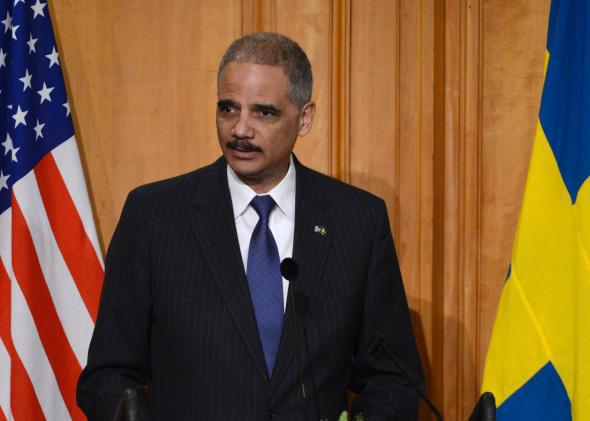On Saturday, Attorney General Eric Holder announced sweeping reforms to the federal justice system designed to treat gay couples equally under federal law. Holder’s Justice Department can institute the new rules unilaterally, but the changes affect only the federal legal system. Is this another case of Holder going quasi-rogue, or is it an inevitable consequence of the death of DOMA? Outward is here to explain.
Didn’t the federal government already treat gay couples equally?
No. Prior to the policy shift, married gay couples were still denied spousal privilege, joint bankruptcy protections, visitation in federal prisons, and survivor benefits from several federal programs. These privileges lie in federal statutes, which the attorney general must interpret and enforce—and under DOMA, they could not be legally granted to gay couples. In post-DOMA America, however, there’s simply no reason why Holder wouldn’t extend such benefits to married gay couples.
Are the new rules legal? The National Organization for Marriage’s Brian Brown isn’t so sure.
They aren’t just legal—they’re constitutionally compelled. In his U.S. v. Windsor opinion, Justice Anthony Kennedy explicitly noted that DOMA “deprives [gay couples] of the Bankruptcy Code’s special protections,” citing such legal burdens as a reason to strike down the law. Thanks to the new policies, any legally wed gay couple can now claim those “special protections.” Kennedy also spoke of various other “duties and responsibilities that are an essential part of married life and that … would be honored … were DOMA not in force.” Holder’s reforms fall squarely within that category.
Do the policies provide gay couples with conjugal visits?
No. Federal prisons prohibit conjugal visits, and states can continue to set their own conjugal visit policies. Intriguingly, the only five states that permit such visits—California, Connecticut, New Mexico, New York, and Washington—also recognize gay marriages. That means that every state with conjugal visits also allows gay conjugal visits.
The new rules do allow gay federal inmates visitation rights with their same-sex spouse. Gay inmates in state prisons, however, remain subject to their own states’ rules.
So can gay inmates in a federal prison get married?
Theoretically, yes. If two gay inmates in federal prison in a state that recognizes gay marriage choose to get married, they won’t face any legal impediments. But that was true before Holder instituted the new policies.
Can they share a cell?
Again, theoretically yes, but prisons have wide latitude to impose any policies in the name of safety, and they could easily decide that a couple sharing a cell poses a potential security risk. If separated, the couple might sue for cohabitation rights. But they would lose.
Do the new policies affect gay couples in red states?
Absolutely. Bankruptcy falls under federal jurisdiction, so a legally married gay couple can file in any federal court, whether they live in California or Kentucky, and receive special spousal protections. Similarly, the federal government runs countless survivor benefit programs, such as Social Security, and can provide benefits to married gay couples no matter what state they live in. Holder’s new policies enroll gay couples in the September 11 Victim Compensation Fund, the Radiation Exposure Compensation Program, and a program for the survivors of police officers and firefighters killed on the job.
What do gay couples in red states need to do to take advantage of the new policies?
Get a good lawyer. Perhaps the most significant new rule is the extension of spousal privilege to gay couples in all federal courts. Under spousal privilege, married couples cannot be forced to testify against each other—and such testimony can often make or break a prosecutor’s case. But a married gay couple in a red state can only claim this privilege in federal court. If their case winds up in state court, they’ll be legal strangers with no privileges at all.
This shift massively heightens the importance of forum shopping for gays. If a married gay person in legal trouble can get his case into federal court, he can claim spousal privilege. But if he lives in a red state and winds up in state court, the privilege disappears. That the mere venue of one’s trial could so profoundly influence its outcome might seem unfair, unwise, and unworkable. But that’s the system we have now, and we might as well learn to make the best of it.
